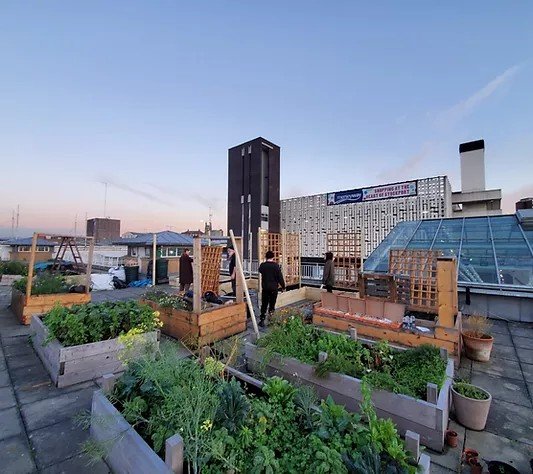Amazing Community Gardens and their power to fight urbanisation
Written by
Alice Greville - Graduate Sustainability Consultant
To contact please email: alice.greville@mainer.co.uk
One in eight households in Britain had no access to a private or shared gardens during the lockdown, can community gardens and the benefits they provide help with the effects of urbanisation?
What is Urbanisation?
Urbanisation refers to the population shift from rural to urban areas, the corresponding decrease in the proportion of people living in rural areas, and the ways in which societies adapt to this change.
Cities are rapidly growing with around 70% of the global population expected to call the city their home by 2050, by this point they will be responsible for 80% of global energy consumption. This increasing rate of growth is a term known as urbanisation.
So what are the side effects of urbanisation?
Increasing urbanisation can lead to:
The Heat Island Effect (the process of heat being trapped by buildings and as a result causing the temperature to rise).
Decreased rates of biodiversity.
Increasing rates of greenhouse gases from increased food miles from transporting food over longer distances.
Decline in mental health rates from lack of access to greenspace.
Increased rates of flooding from impermeable surfaces.
What do we mean by ‘Nature based solutions’?
There are a variety of type of nature-based solutions such as urban socio-ecological corridors, green roofs and walls, sustainable drainage systems, park creation and community gardens.
Nature based solutions are the process of enhancing, managing and protecting nature to combat a variety of social and environmental issues.
Urban solutions use nature to combat the side effects of increasing urbanisation and climate change.
Solutions, like community gardens, can help to combat the side effect of urbanisation, through a variety of ways. Increasing the rate of biodiversity, increasing mental health through providing access to green space and helping mitigate the side effects of climate change through increasing the resilience of our ecosystems. They also increase the air / water quality, reduce the rates of heat island effect and pollution levels and help to address food security.
What are Community Gardens?
Community gardens are areas of green space that are available to use by the local community where people have the opportunity to meet other members of the community and learn new skills, and access green space they may not have access to at home.
Community gardens encourage people to be more active, as well as provide the opportunity for carbon to be sequestered. They can also teach individuals the skills to grow their own fresh fruit and vegetables improving their overall health. There are two types of community gardens place based and interest based. Interest based gardens are run by members of the community. Place based gardens are run by members outside of the local community. Those that are place based are often run by social enterprises.
Social enterprises are organisations that are set up with the aim of enhancing environmental and social welfare over generating profit. They are a new way of investing in businesses with a purpose, and there are over 100,000 social enterprises within the UK, generating over £60 billion to the economy.
There are a variety of ways that community gardens can be structured, some have raised beds, polytunnels and/or sheds for storage and meetings, but generally they come in all shapes and sizes and depend on the needs of the project. A community garden may be surrounded by a fence for safety reasons others are open and accessible. Some community gardens are aimed at a specific subset of people such as those suffering with mental health issues or asylum seekers, whereas others are more focused on the community as a whole and can be attached to a community centre. Usually, they are free to join and are a great way to meet like-minded people and grow your own healthy produce.
There are a variety of community garden projects around the world based in urban areas. Some great projects in Manchester include:
Manchester Urban Diggers (MUD):
Set up in 2019 in an attempt to find solutions to problems in Manchester’s local food systems. They are a non-profit social enterprise that use the finances generated to invest in the community through projects and employment opportunities. They have a variety of projects, throughout the Manchester area, including Platt Fields Market Garden their largest garden, Mona Street Community Garden located in Salford, which provides food for the local restaurant as well as the community. They are also us They offer a variety of volunteer opportunities which you can get involved in by contacting them via their website the Landing which provides food for the local restaurant as well as the community. They are also use their waste to enrich the soil, making the process circular. They offer a variety of volunteer opportunities which you can get involved in by contacting them via their website.
Photo Source: (8) Growing Together Levenshulme | Facebook
Growing Together Levenshulme is a charity located in Manchester that run therapeutic horticulture sessions on Tuesday for individuals that are refugees or asylum seekers. Through the project they help to build a community and establish a sense of solidarity through growing and cooking food, as well as provide a safe space to relax. They have around 30 refugees and asylum seeker that visit per week and are always on the lookout for new volunteers to help out
Photo Source: Garden Needs, Supporting Health and Wellbeing in Salford
A mental health-based community garden located in Salford, that is available to all Salford residents every Tuesday and Thursday. Their vision is to be a pioneer in connecting people with nature and inspire them to lead healthier and happier lives. They offer the volunteering in the garden, free horticulture courses and woodland wellbeing sessions, all focused on improving your mental and physical wellbeing. They provide a safe and calming space to help people integrate into the local community and build resilience.
This small community garden was converted from public toilets, into a thriving green space for residents. This garden took a turn for the worst during Covid, however it has been taken over by the Friends of Chorlton Community Garden group, under the wing of our local civic society, Chorlton Voice. We are meeting to discuss how we can repair, develop and enhance the space for all Chorlton residents and visitors.
In the future they will carryout out a series of surveys, online and in public, to find out what functions and facilities local people would like from a refurbishment of this space. Read a summary of the Chorlton Community Garden survey summary.
Photo Source: Hello - Our Green Chorlton (Click Map for Large Version)
The benefits that Nature based solutions offer against urbanisation are clear. Community Garden in particular, from tiny plots to large scale schemes, offers a multitude of solutions that help humans, help the environment and can even benefit businesses too.
If you have been inspired, why not start your own Community Garden?
Click the link below to start your green fingered journey!
If you need to discuss any of the topics raised, please contact us here














